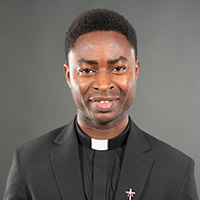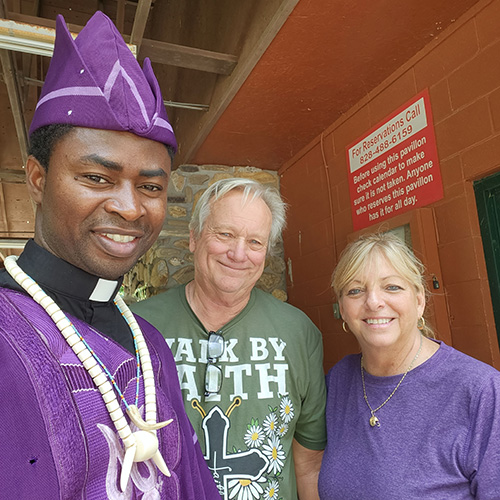Father Victor Ameh
From big city to small mountain towns
 Nigerian-born Father Victor Ameh now pastors St. Joseph Parish in Bryson City and its Our Lady of Guadalupe Mission in Cherokee.Nov. 24: Father Victor Ameh begins new spiritual journey in Bryson City and Cherokee
Nigerian-born Father Victor Ameh now pastors St. Joseph Parish in Bryson City and its Our Lady of Guadalupe Mission in Cherokee.Nov. 24: Father Victor Ameh begins new spiritual journey in Bryson City and Cherokee
BRYSON CITY — Becoming a pastor has definitely been a learning experience for Father Victor Ameh.
Not only was the Nigerian-born priest taking on the role of pastor for the first time – he also was assigned to a parish and a region he was completely unfamiliar with.
Previously, Father Ameh worked in parishes in Nigeria and New York as both a priest and missionary. He arrived in the Diocese of Charlotte in 2024 and served as parish administrator at Our Lady of the Assumption Parish in Charlotte since February. Now, he’s left the diocese’s biggest city and settled in the North Carolina mountains, where he’ll pastor St. Joseph Parish in Bryson City and its Our Lady of Guadalupe Mission in Cherokee.
He recently reflected on his new assignment:
 Father AmehCNH: What does it mean to you to become a pastor?
Father AmehCNH: What does it mean to you to become a pastor?
Father Ameh: When the letter came from the bishop that I was assigned as pastor to St. Joseph’s in Bryson City and a mission church at Cherokee, I was excited on the one hand, having been made a pastor, but on the other hand, I had no idea where Bryson City or Cherokee were – and what kind of people I was going to serve. A friend of mine, after looking it up on the internet, told me it was in the mountains. I was somewhat convinced that God has an interesting story to tell with me. Friends, I am not kidding you, it was a three-hour drive from where I was living at the time in Charlotte.
CNH: How have your earlier assignments helped you in your new role?
Father Ameh: I have worked as an associate to pastors who embody the spirit of dedication, passion for ministry and inspiration. From my years in the seminary and from the pastors I had earlier worked with, I had learned the role of a pastor is that of being all things to all people, as St. Paul rightly put it (1 Cor. 19:19-23). As administrator at Our Lady of the Assumption, many of the decisions about shepherding lay on my shoulders. Amazingly, that provided me with much opportunity for personal and professional growth.
CNH: How have your first few weeks as pastor been going?
Father Ameh: My first Sunday in church was deeply significant, as those who came to church wondered how I managed to speak good and clear English. I knew firsthand that I had inherited a very welcoming community. I received a warm welcome from the congregation, with members eager to introduce themselves, share their stories and to hear mine afterwards. Becoming part of this community and forming new relationships with the different families in the parish has been a source of inspiration, joy and support. Also, listening to the parishioners has been crucial. Understanding their needs, concerns and desires helped me build trust with the community. I intentionally used my first few weeks to learn about the church’s history, traditions and mission as a small unit within the collective body of the universal Church. Understanding the community’s needs and dynamics has been key in my ministry to them thus far.
CNH: What have you learned so far?
Father Ameh: I have learned the People of God are good everywhere and truly seek God with a sincere heart, irrespective of their race, background and social class. I have also created time within my weekly schedule for pastoral care for the sick in their homes and hospitals, providing members of my parish family with significant support in the Eucharist. I soon came to learn that ministry often requires adaptability – being prepared to adjust to plans and respond to unexpected challenges.
My role has required dedication, compassion and a commitment to serving Catholics and others within my parish geographical territory, Christians and non-Christians alike. Thanks to some of my parishioners who have been constructive in their feedback, I have been open to learning from both my successes and mistakes.
CNH: What challenges have you faced?
Father Ameh: Becoming a pastor has its own challenges. The first challenge that confronted me was trying to fit into the shoes of the previous pastor, who had worked passionately for and with the people for many years. I understand that my personality and style of shepherding may differ from his. Secondly, I am tasked with the responsibility of forming a parish council that can oversee the life and administration of the parish. Thirdly, because of our small size, the parish has no administrative personnel, so I have to be the pastor, secretary and catechist, to mention but a few roles. Nevertheless, I am optimistic that things will gradually fall in place as I look into the future with hope and with wonderful people here to give me all the helping hands I need.
CNH: Do you have a devotion to a particular saint that helps you with your ministry?
Father Ameh: I have developed a loving relationship with three saints who are very dear to my heart: Mary, Mother of God; St. Joseph; and St. John Paul II. Perhaps the reason for choosing the first two may be obvious, since both were guardians of Jesus – and my biological mother and father also go by these names. As a student under formation many years back in the seminary, I fell in love with St. John Paul II and his writings. His understanding of the priesthood and of personhood has greatly shaped who I have become today. He believed that the priesthood is a mystery, and that of service to God’s people, bringing the love and strength of Christ to them.
— Christina Lee Knauss
Bishop Michael Martin will formally install these first-time pastors during special Masses in the coming weeks. Meet the others.
 I am often asked, especially by my college students, why I became a priest. I’d usually say: to serve and to save! And they’d say, “What?”
I am often asked, especially by my college students, why I became a priest. I’d usually say: to serve and to save! And they’d say, “What?”
So I’d explain further: To serve God and to help save souls for the Kingdom! As easy as that sounds, it is quite deep and tough.
When I look back and remember how my priestly journey began in Lagos, Nigeria having worked briefly at a parish before becoming the Secretary to the Cardinal and the Archdiocesan Master of Ceremonies, I never imagined in my wildest dreams that someday I’d be ministering to parishioners and college students on the other side of the Atlantic, approximately 5,500 miles away from home. I guess it is part of the calling to serve and to save!
After my ordination and first Mass, the only thing that I could think about was how blessed I am. Yes indeed, God has been so good to me, and I am continually amazed at how the Lord has continued to bless me in ways that I never thought possible. Over the past few days, I have had the opportunity to look back and reflect on what this past twenty years have been like. I keep coming back to the sentence: “My heart is full of joy.”
Celebrating the sacraments with the people and for the people has been a cause of great joy for me. While working temporarily at a parish in the Archdiocese of New York while I did my graduate studies at Fordham University, and now journeying with college students in my current assignment, has been an immense blessing for me as I am continually energized when I see my young friends who are trying to work through a very difficult stage in life. There is a great zeal and heart in these students as they wrestle with life’s big questions and challenges and figure out how they can reflect Christ to the whole world. I am so Impressed and amazed with all they do on these campuses and for themselves. Again, my heart is full of joy. Archbishop Fulton J. Sheen wrote, “A priest is not his own.” This phrase does not merely give reference to the ministerial life of a priest but to the joys and sorrows of his whole life. A priest is a public person and thus needs to be aware that a certain vulnerability is necessary for the life of the people to shape him and to help him grow as the man of God our Lord called him to be. I thank my students for helping to shape me into a better priest so I can continue to serve and to save!
Finally, thank you all for your prayers, your support, your sacrifice, and your love as you continue to inspire me to be the best priest that God has called me to be.
Know that you reflect the love of Christ and for that, my heart is full of joy.
Father Marcel Amadi is director of campus ministry at Wake Forest University.


